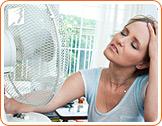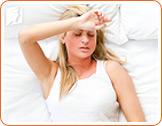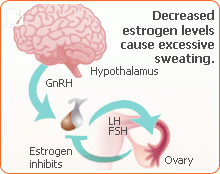
Hot flashes and night sweats are two of the most common and disruptive menopause symptoms. They are closely related and can greatly impact a woman's daily life. If a woman is not expecting hot flashes or night sweats and doesn't know how to deal with them, a sudden episode of either can be frightening. It is important to learn about hot flashes and night sweat episodes so that you will know how to manage them.
What Are Hot Flashes and Night Sweats?

The main difference between them is that hot flashes occur during the day and night sweats happen during sleep. Both include sensations of intense heat in the upper body, accompanied by increased heart rate, flushing of the chest, neck, and face, and often excessive sweating. A night sweat episode can leave sleepwear and bedding drenched in sweat. Hot flashes and night sweats can last anywhere from thirty seconds to five minutes. Intensity and frequency vary from person to person. In the three years leading up to menopause, half of women experience hot flashes and night sweats.
Common symptoms of hot flashes include:
- A feeling of intense heat in the upper body
- Flushing of the skin
- Increased heart rate
- Excessive sweating
- Chills and shivering
Common symptoms of night sweats include:
- Damp bedding
- Chills and shivering
- Sleep problems
What Causes Hot Flashes and Night Sweats?

The root cause is uncertain, but it is widely believed that the the hypothalamus - the part of the brain that regulates body temperature - triggers them by incorrectly detecting that the body is overheating. This releases compounds into the body that increase heart rate and dilate blood vessels near the skin so that heat can be emitted to cool the body down. Decreased estrogen levels during menopause are linked to malfunction of the hypothalamus.
Hot flashes and night sweats, along with other vasomotor symptoms - or bodily changes related to the constriction and dilation of blood vessels - decrease in severity and frequency after menopause. However, some women may still experience hot flashes and night sweats during postmenopause.
Click on the following link to learn more about the treatments for hot flashes and night sweats.
Sources
- National Health Service UK. (2015). Hot flushes: how to cope. Retrieved November 17, 2015, from http://www.nhs.uk/Livewell/menopause/Pages/hot-flushes.aspx
- National Prescribing Service Australia, Medicinewise. (2014). Managing hot flushes in menopause. Retrieved November 17, 2015, from http://www.nps.org.au/publications/consumer/medicinewise-living/2014/managing-hot-flushes



